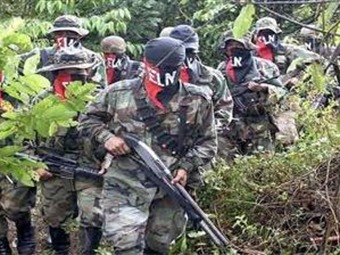Rebels from Colombia‘s smaller rebel group have kidnapped five prospectors and launched attacks across the country in an effort to force the government into granting them a seat at peace negotiations.
Guerrillas from the National Liberation Army (ELN) snatched five members of a gold mining exploration team, among them a Canadian and two Peruvians, in the south of Bolivar province, long a rebel stronghold. The Peruvian government has sent two police colonels to work alongside the Colombian security forces.
The Colombian government has deployed 1,500 troops, among them special forces, to pursue the kidnappers and free the hostages. Army sources indicated that several ELN units had been involved in the kidnapping operation, suggesting that it may have been planned well in advance.
The ELN were told earlier this month that the government would not start a peace process yet with this group. The government has expressed willingness to engage with the ELN, but it appears the time is not yet propitious. The government has been in peace talks, since September last year, with the Revolutionary Armed Forces of Colombia (FARC). Talks are currently underway with the FARC in Cuba, and the government said that this rebel group has until November 2013 to reach a peace agreement to bring an end to 48 years of civil conflict.
InSight Crime Analysis
The area where the kidnappings took place is close to one of the ELN’s historic strongholds. In the southern part of Bolivar province there are not only heavily armed ELN units, but also several hundred fighters of their FARC allies. The FARC had declared a unilateral truce from November 20, 2012 to January 20, 2013 hoping to prompt the government into making it a bilateral ceasefire. The government has ruled out such a step, at least for now, and the security forces are braced for a FARC offensive, which the ELN may well now also join. Indeed on the 20th, when the truce expired, the FARC blew up an oil pipeline in the southern province of Putumayo.
The ELN have not restricted their hostilities to this kidnapping. Since the start of this year they have launched actions in the provinces of Arauca, Boyaca, Choco and Norte de Santander. They have also blown up an oil pipeline in Norte de Santander, twice.
The ELN are copying the FARC tactics of hitting multinationals and key infrastructure. From January to August last year, the FARC targeted oil, electricity and mining infrastructure and personnel across the country, a strategy which is believed to have contributed to the fact that the government opened peace talks with them. While the ELN does not have the same reach as the FARC, they can make life very difficult for the government in seven of Colombia’s 32 departments or provinces.
This is not the first time the ELN have tried to kidnap their way into a peace process. In 1999, after the FARC were given a 42,000 km² safe haven by then president Andres Pastrana, the ELN requested a similar demilitarised zone in the south of Bolivar province. When the government refused, the ELN conducted three high profile kidnapping operations. In April 1999 ELN rebels hijacked a domestic flight in midair, forcing the pilots to land on a jungle airstrip and kidnapping all 46 people on board. In May the same year, 160 people were taken from a church in the outskirts of Cali. This was followed in June with the interception of a boat near the Caribbean city of Barranquilla from which nine people were kidnapped. Despite these operations, the ELN were unable to force the government into granting it equal treatment to its more powerful FARC cousins. The same is likely to be the case now.
While the FARC have asked for the inclusion of their ELN allies into the peace process, the government is not yet ready to open dialogue with the 3000-strong group. Sources close to the negotiations have told InSight Crime that there are several reasons for this, the first among them that the government wants to make some concrete progress with the FARC first. Other reasons are that the ELN want to discuss many more themes than those on the FARC agenda, and is insisting on the inclusion of civil society in the dialogue. The government fears this will simply bog down the entire process.
While the FARC have abandoned kidnap for ransom, one of the government preconditions for sitting down to talks, the ELN still use this as a principal means of raising revenue, along with extortion, and increasingly, drug trafficking. Fears are that more kidnappings are likely during 2013.

